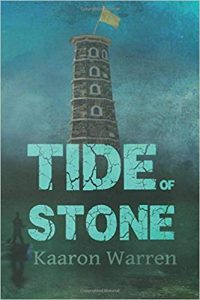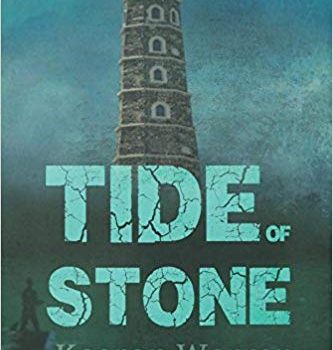Ian Mond Reviews Tide of Stone by Kaaron Warren
 Tide of Stone, Kaaron Warren (Omnium Gatherum 9780615827995, $14.99, 374pp, tp) May 2018.
Tide of Stone, Kaaron Warren (Omnium Gatherum 9780615827995, $14.99, 374pp, tp) May 2018.
When the Time Ball Tower is first mentioned in Kaaron Warren’s terrific new novel Tide of Stone, I thought it was an invention of the author. I had no idea they existed and that I’d been living near one my entire life. For those, like me, ignorant of this ancient time-keeping device, a Time Ball is an apparatus situated at the top of a tower, sometimes a lighthouse, where a large stone or metal sphere is dropped at a precise hour each day to inform shipmasters of the time. The Towers that still stand, such as the one in Williamstown, Victoria, Australia, are mostly tourist attractions.
That’s not the case for the Time Ball Tower constructed in the fictional town of Tempuston. It doesn’t draw a crowd, and it doesn’t measure time. Rather, since 1868 it’s been repurposed as a prison for men and women who have committed the most heinous crimes. Before they are sent to the Tower the criminal is given a choice: they can be put to death or, as the first judge to commit someone to the Tower explains, “We can give you something few men have had. Eternal life.” If they choose life – they all do – the criminal is force-fed a preservative that pickles their body, leeching out the moisture, gradually transforming them into undying, brittle skeletons. A living death.
The book opens with a first-person account from Phillipa Musket. She has been bestowed the great honor of becoming the 147th Keeper of the Time Ball Tower, a privilege granted to her family for generations. Not everyone, though, is pleased for Phillipa. Her best friend, Renata, hates the Tower; her family has “been fighting the process of mortification” since the first prisoner was brought to Tempuston. Phillipa, though, is clear in her convictions and her responsibility to safeguard society from the evil warehoused in the Tower. She even tends daily to the desiccated cadaver of Burnett Barton, the man who oversaw the construction of the Tower back in 1868, who took on the role as the first Keeper and who drank the preservative that continues to keep him alive.
Warren dedicates Tide of Stone to her parents, whom she thanks for “teaching me to think outside the ordinary.” This attitude permeates the novel, and is evident when Phillipa, as part of her preparations, accesses the records kept by each Keeper. Rather than provide the odd snippet or highlight from a report, Warren, thinking outside the ordinary, invites us to follow Phillipa’s lead and read every single account. What should be tedious – more than half the novel is devoted to these records – is instead utterly fascinating, tracking a complicated lineage of brothers and sisters, fathers and mothers, uncles and aunts. Sometimes the reports are in conversation with the Keepers that have come before, and sometimes they provide advice, helpful tips, for those that are to come. What’s striking, though, is how attitudes remain consistent over a century and a half. The Keepers detest the prisoners, reviling each new arrival. They don’t mention torture, but they warn against showing any pity or sympathy to these wretched creatures. The accounts, most of them less than half a page, provide us with an uncompromising, unflinching portrait of evil. It’s impossible to look away.
As much as the Keepers reinforce the awful crimes committed by the prisoners, the cumulative effect of reading every report creates the impression of a tightly knit community that’s rarely questioned the morality of the Tower. When Phillipa takes her turn as the Keeper, she doesn’t immediately recognize what we, the reader, already apprehend, that whatever evil these men and women perpetrated, their punishment has lost any meaning or value, if it had any at all. This is suffering for the sake of suffering, meaningless, cruel and devoid of humanity. The message of this novel isn’t that incarceration is wrong or unjust, it’s that any punitive action, no matter how gruesome the crime, needs to contain an element of compassion. It needs to reflect us at our best, not at our worst. Sadly, in the current climate, where politicians frame punishment as a form of community retribution, this is a minority view.
I don’t want to leave you with the impression that the Tide of Stone is an overly earnest or academic novel. It’s also creepy as all get out. Aside from keying into the themes of the story, the Keeper’s reports build an atmosphere of existential dread; you’re never the same after you’ve spent some time with the prisoners. Once we get inside the Tower, Warren doesn’t hold back from assailing us with the sights, sounds and smells of the place, all of it punctuated by the maddening, daily clang of the Time Ball. There are also secrets to be revealed – that I won’t spoil here – a truth that’s as monstrous as any of the crimes committed by the prisoners.
With Tide of Stone, Kaaron Warren proves that horror fiction can do more than just deliver disturbing imagery and violence. It can also compel us to confront our own assumptions and moral principles, to look outside the ordinary.
This review and more like it in the August 2018 issue of Locus.
 While you are here, please take a moment to support Locus with a one-time or recurring donation. We rely on reader donations to keep the magazine and site going, and would like to keep the site paywall free, but WE NEED YOUR FINANCIAL SUPPORT to continue quality coverage of the science fiction and fantasy field.
While you are here, please take a moment to support Locus with a one-time or recurring donation. We rely on reader donations to keep the magazine and site going, and would like to keep the site paywall free, but WE NEED YOUR FINANCIAL SUPPORT to continue quality coverage of the science fiction and fantasy field.







